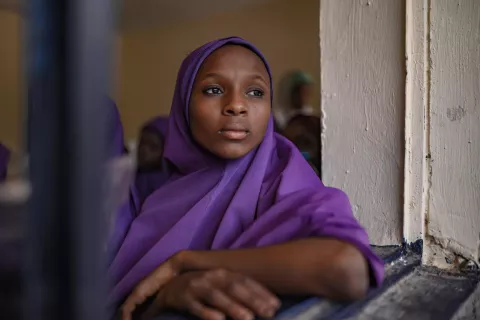Angolan football stars team up for national birth registration campaign
In Angola, three in every four children under 5 have no birth certificate.

- Available in:
- English
- Español
LUANDA, Angola – Sabino Tchissingulo has seven children who all have one thing in common: an unwavering love for Angolan football team Petro de Luanda. Watching football together is a beloved family ritual.
But one Saturday, when Sabino headed to a national football championship match – one of the most awaited ones of the season – with his three eldest children, little did he know what was about to happen in the stadium.
Before the match started, in front of a standing ovation from 30,000 fans, the captains of the two teams Petro de Luanda and 1º de Agosto kicked competitiveness aside and took a bold stand on behalf of children.
“Responsible Fatherhood: We are in!”, they shouted ─ their voices reverberating through the stadium and televisions across the country.

No registration: no proof of name or nationality
Without a birth certificate children are denied basic services ─ like going to school, or seeing a doctor when they are sick. The football stars reminded the crowd how seriously the lack of birth registration affects children’s lives and urged every single father to register their kids.
For Sabino, the message hit home: only two of his seven children are registered. And his family is not the exception in Angola. The country suffered over four decades of armed conflict, from independence to civil war, which ended in 2002 and had profound consequences for the civil registration system.
The right to a name is the right to participate in society. However, the latest National Census in 2014 revealed that only 25 per cent of children under 5 years have a birth certificate. The vast majority has no proof of their name or nationality. Without birth registration, children do not exist before the law and, as a result, cannot access their fundamental rights.

Why the focus on fathers?
Asking for the support of the country’s male football stars was no coincidence. In Angola, the National Children Institute lists fathers who do not recognize their children – or do not take part in their education and development – as one of the causes of low birth registration rates. So much so that addressing paternal abandonment has been included in the country’s National Development Plan 2018-2022.
Although it is legal for a single mother, or father, to register a child without the presence or recognition of the other parent, many single mothers hesitate to do this. Social norms, lack of knowledge and shame all play a role in leaving thousands of children without access to one of their most basic rights ─ the right to a name.
So when Angola’s Ministry of Justice and Human Rights, which oversees the country’s civil registration system, decided to focus on fathers in a massive national campaign, football players lined up to join the “Responsible Fatherhood: I’m in” campaign.
Also promoting the campaign is Angolan music star Anselmo Ralph who, for the first time ever, agreed to be filmed with his family to raise public awareness about the life-long impact the lack of a birth certificate can have.
“We advocate for measures to give children the best start in life, because proper care at the youngest age forms the strongest foundation for a person’s and society’s future.”

Helping parents to register their children
Although birth registration is its first and most urgent action, the campaign has a broader approach, which includes promoting positive parenting practices (i.e. without the use of violence) ─ with the help of the media, faith-based organizations and community leaders.
And as demand for civil registration rises, the Government of Angola is finding new ways for parents to register their children – from registration points in maternity wards to mobile teams visiting remote villages.
As for Sabino, something changed for him after the game. “I’ll look for a registration point next week,” he said. “I have five to register, though... Perhaps I’ll have to do it one at a time. But I’ll do it.”
The Government-led “Responsible Fatherhood: I’m in” campaign is supported by the European Union and UNICEF.


